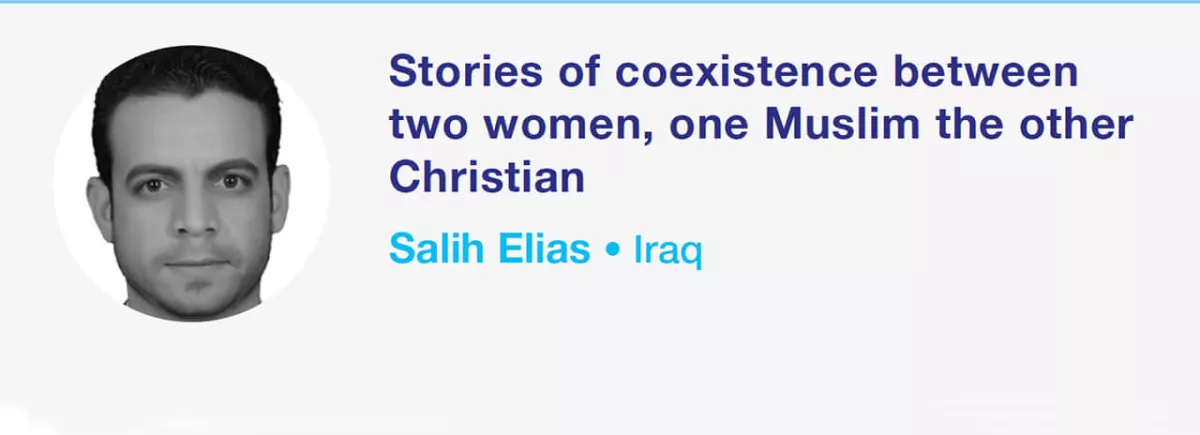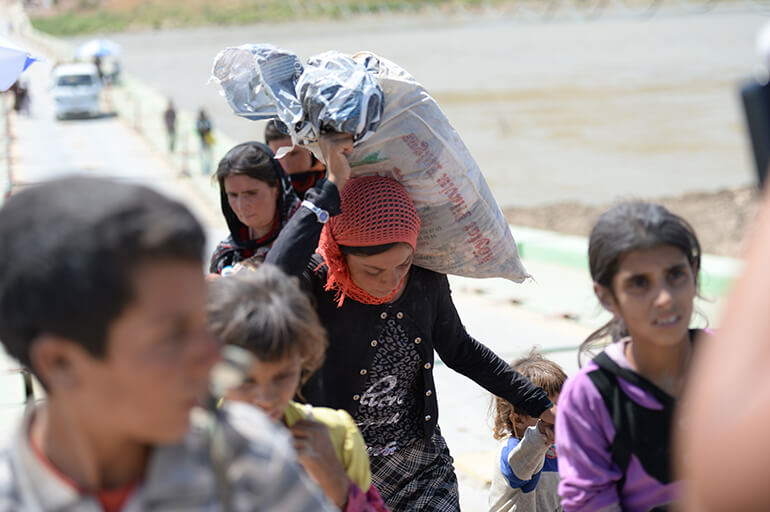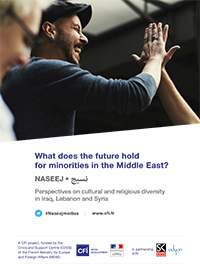
Stories of coexistence between two women, one Muslim the other Christian
Related project
NaseejDiscover a selection of the best articles dealing with cultural and religious diversity in the Middle East, entered in the Naseej competition launched by CFI and SKeyes in October 2017.
This week, the Iraqi journalist Salih Elias tells the beautiful friendship between two women from Mosul, one Muslim and the other Christian.
Published in Niqash on 13 July 2017
The most remarkable stories about Mosul are those that tell of the wonderful relationships established between the city's inhabitants, despite being governed by extremists. Such a one was forged between two women who were neighbours, one a Muslim, the other a Christian.
The story of Oum Saleh and Rafdine is worth the detour from Baghdad to Mosul, a region at times falling under the fire of Daesh missiles. I contacted Oum Saleh's family and we agreed to meet in Camp 500 in the Hamam al-Alil region, south of Mosul.
[…]
Rafdine is 43 years old. Her story begins on 19th July 2014. She awoke at home, in one of the western districts of Mosul, to find herself with a dilemma: either she must abandon her religion to convert to Islam, or die. She had already missed the deadline set by Daesh at the time, a deadline of 72 hours.
Prior to that cut-off date, thousands of Christians left the city, heading for the Nineveh Plains and Iraqi Kurdistan. Only a few dozen people remained in Mosul, and each had their reason. In Rafdine's case, she had not been aware of Daesh's decisions regarding Christians because she lived alone and her mobile phone was off. Rafdine was confronted with IS harassment and loneliness, until she met Oum Saleh. That event changed the course of her life.
Oum Saleh, aged 45, is a Muslim woman who has also experienced her share of tragedy after being chased from her house by IS. A house where she had lived with her family for over thirteen years. A home that Daesh turned into a storehouse for explosives and weapons. She therefore went to the Al Mansour district in the south of the city, to a house adjoining Rafdine's.
Watchful eyes and a helping hand
Rafdine tells me her story in the little house where she currently lives with Oum Saleh and her family, in the new Mosul region, following her return from the Displaced Persons Camp, south of the city: "
I learnt of the arrival of new neighbours. At first I distrusted them because I was afraid their sons were affiliated to Daesh, simply because they resembled members of the organisation. I wanted to clear the matter up, so paid them a visit several times, to discover in the end that they are peaceful and really nice."
It seems to me that Rafdine is not ready to forget the difficult times she experienced under the domination of Daesh.
She had to remain alone, using only her cunning to guard her life. That is why she encouraged a Christian family who remained in Mosul to follow her to one of the tribunals set up by the organisation, for them to be spared, once their flight from the city appeared impossible to them.
"
That's when we declared our conversion to Islam, purely as a matter of form, to get rid of the extremists", she says, adjusting her veil. "I wasn't afraid, but my friends were trembling in front of the Islamic fundamentalist judge. We were indeed playing with fire, any mistake on our part would have sent us to the guillotine".
She spoke for a long time about the harassment she suffered from the organisation, how the hisbah (morality police in charge of checking that people respect the precepts of Sharia governing every aspect of daily life
) arrested her on one occasion for not wearing the niqab. She remembers the accusations made against her when she refused to marry one of the Daesh emirs, saying: "He asked for me in marriage but I refused. I want neither emir nor Samir".
Everyone laughs, listening to her talk, even Abou Saleh, a quiet, discreet man. It appears the family is used to her cynicism.
Oum Saleh continues the story: "
I remember my first encounter with Rafdine, looking thin and pale because of her wretched psychological state. She was terrified and would jump at nothing. I felt pity for her, not just because she was Christian but also because she was alone. So, I told her she could come when she wanted and that she was part of the family. Regard me as your mother, despite the fact we're almost the same age, I told her. And that's exactly what I became for her".
At that time, the extremists were turning their attention to the Christians who had remained in Mosul, following their conversion to Islam, whilst this woman spent most of her time at her neighbours', sharing their meals and only going to her own home to sleep.
And Oum Saleh, whose face is furrowed with wrinkles despite her young age, adds: "
She felt safe with us because her relatives had rejected her, accusing her of converting to Islam to marry a Muslim. But we knew the truth. She hadn't abandoned her religion, she'd declared her conversion to Islam to stay alive. If Daesh had known, they'd have killed us all".
When life in Mosul became unbearable, the two women grew even closer. Last February, operations to liberate the western districts of Mosul had begun and famine was at its height in the city. Rafdine was therefore forced to leave her house and move in with her neighbours.

Returning the favour
After a long and dangerous journey, the group arrived at Displaced Persons Camp 500 in the Hamam al-Alil region, south of Mosul. Both women received a tent but decided to continue to live together. They shared the same tent and left the second for Abou Saleh and his sons.
News soon spread that there was a Christian woman living with this family. Visits followed on, one after the other, to their tent which became the venue for people in search of exciting stories and even politics.
Rafdine received a lot of phone calls from her relatives living in Iraq and abroad, asking her how she could live with a Muslim family she did not know. She answered in her Chaldean language: "
These people are not strangers, they're my family." She would not translate those conversations for Oum Saleh.
When the Church learnt of the existence of this Assyrian-Chaldean woman who had come to Mosul with her parents thirty years before to flee the Iran-Iraq war, it invited her to go to Erbil where many displaced Christians from Mosul live. However, Rafdine responded to their invitation as follows: "
I will not move from here without bringing Oum Saleh and her family with me". The Church refused her condition, perhaps because of the complicated procedures laid down by the authorities in the Kurdistan region with regard to displaced persons from Mosul. She therefore remained
in the camp for about three months and then went to the town with her new family.
When I asked her why she had not gone to Erbil or Dohuk, where she could have had a decent life, she pointed out Oum Saleh and her family to me, replying: "
My own relatives stuck a knife in my back, I will never forget what this family did for me."
Rafdine returned to her house in the Al Mansour district and Oum Saleh lived temporarily in a small apartment in the new Mosul region, for the time it took to find new accommodation near where her sons work, because her old house was completely destroyed by the bombing. But the relationship binding these two women was not over and they still planned to get accommodation near to each other. I listened to them reflecting on this, out loud.
I learnt during my last phone conversation with Oum Saleh's family that she left her house to flee the mortar attacks and that she had to return to the Al Mansour district, near to Rafdine. So, the war finally granted the two women's wish.
Find the ten finalists of the
Naseej competition in the What does the future hold for minorities in the Middle East?



